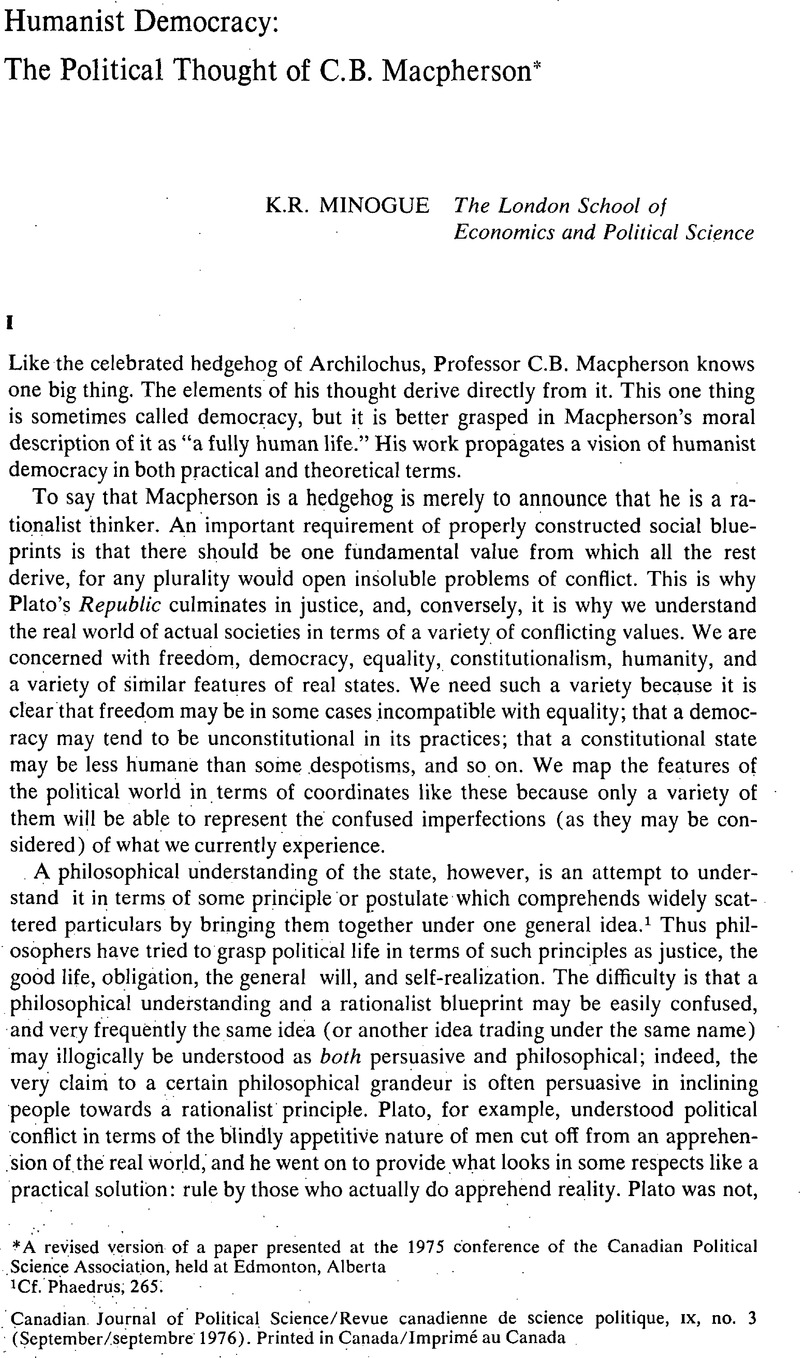Article contents
Humanist Democracy: The Political Thought of C.B. Macpherson*
Published online by Cambridge University Press: 10 November 2009
Abstract

- Type
- An Evaluation of C.B. Macpherson's Contribution to Political Thought / Une évaluation de la contribution de C.B. Macpherson à la pensée politique
- Information
- Canadian Journal of Political Science/Revue canadienne de science politique , Volume 9 , Issue 3 , September 1976 , pp. 377 - 394
- Copyright
- Copyright © Canadian Political Science Association (l'Association canadienne de science politique) and/et la Société québécoise de science politique 1976
References
1 Cf. Phaedrus, 265.
2 The Real World of Democracy, The Massey Lectures (Oxford 1966), 1; henceforth cited as RWD
3 Philosophy and the Historical Understanding (London 1964), 157
4 RWD, 18
5 Democratic Theory: Essays in Retrieval (Oxford 1973), 51; henceforth cited as DT
6 DT, 51
7 Cf. Leviathan, 1, 11. Hobbes, of course, does not talk of “infinite” consumers, or indeed about “consumers” at all, and he is concerned with human beings responding to insecurity. Just as poetry is what gets lost in translation, so Hobbes's meaning does not survive this transposition into an alien vocabulary. But the eccentricities of exhibiting Hobbes as a “bourgeois” philosopher are to one side of this paper.
8 DT, 34
9 Cf. especially Principles of Morals and Legislation, chap. 11.
10 DT, 64
11 DT, 40
12 In the course of discussion at the conference to which this paper was presented, Professor Macpherson seemed to take the position that since his argument was structural it could not be exemplified without the likelihood of misunderstanding. I do not understand the difficulty, and expressions like “power in the most neutral descriptive sense” (my emphasis) suggest that some connection with the “real world of democracy” must be admitted. It will be observed that my main criticism of Professor Macpherson is of equivocation, and that the tactic of the paper is to open up Professor Macpherson's argument in terms of what it would mean as an account of everyday political experience to which, in various ways, it inevitably refers.
13 DT, 41
14 Ibid.
15 DT, 46
16 Dentists and heart specialists might well think such a culmination desirable. Nor is this point frivolous, because the switch from capitalism to socialism is, amongst other things, a switch from individual demand in terms of money to political decision, presumably by majorities. It is not at all inconceivable that a majority might at one time or another be forthcoming for the banning of chocolate because of its bad effects. The general drift of our present world is strongly in favour of using political power to abolish anything which is misused by the feebler or stupider members of society.
17 Cf. DT, 44
18 DT, 64–5
19 DT, 67
20 Time, 10 March 1975
21 DT, 135
22 Cf. Dunn, John, The Political Thought of John Locke (Cambridge 1969)CrossRefGoogle Scholar
23 DT, 131–2
24 DT, 134
25 Ibid.
26 “Elegant Tombstones: A Note on Friedman's Freedom,” DT, 143
27 DT, 146
28 DT, 134
29 DT, 135
30 One version of this argument appears in Macpherson's discussion of Isaiah Berlin's Two Concepts of Liberty, where any deliberate invasion of liberty by governments or by majorities is assimilated to the “coercion” of the working class by “the laws of property and contract” (DT, 98). Macpherson constantly stretches abstractions in order to grind down all distinctions which stand in the way of the one fundamental criterion: a fully human life.
31 DT, 22
32 The Third World seems to feature in Professor Macpherson's imagination as a kind of moral spectator and judge of Western doings. For a discussion of this (and other) features of his work, see Dunn, John, “Democracy Unretrieved, or the Political Theory of Professor Macpherson,” British Journal of Political Science 4, no. 4 (October 1974), 489.CrossRefGoogle Scholar
33 DT, 22
34 Ibid.
35 DT, 55; cf. 74
36 DT, 76
37 Indeed, he has been attacked from the left for “latent pessimism” and a reluctance to face up to the necessary regeneration of the masses. See Weinstein, Michael, “C.B. Macpherson: The Roots of Democracy and Liberalism” in Contemporary Political Philosophers, ed. de Crespigny, A.R. and Minogue, K.R. (London and New York 1975).Google Scholar
- 2
- Cited by


